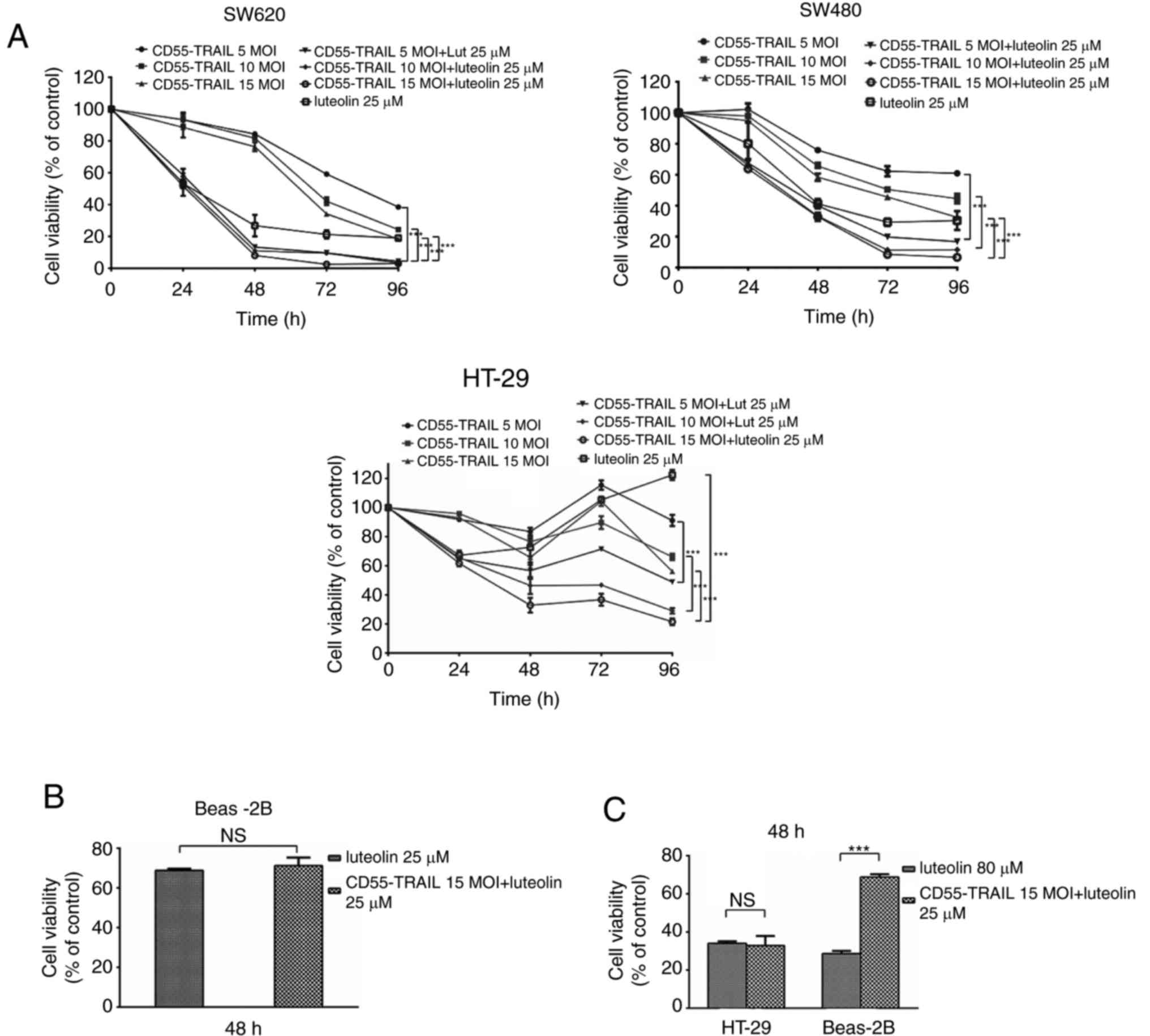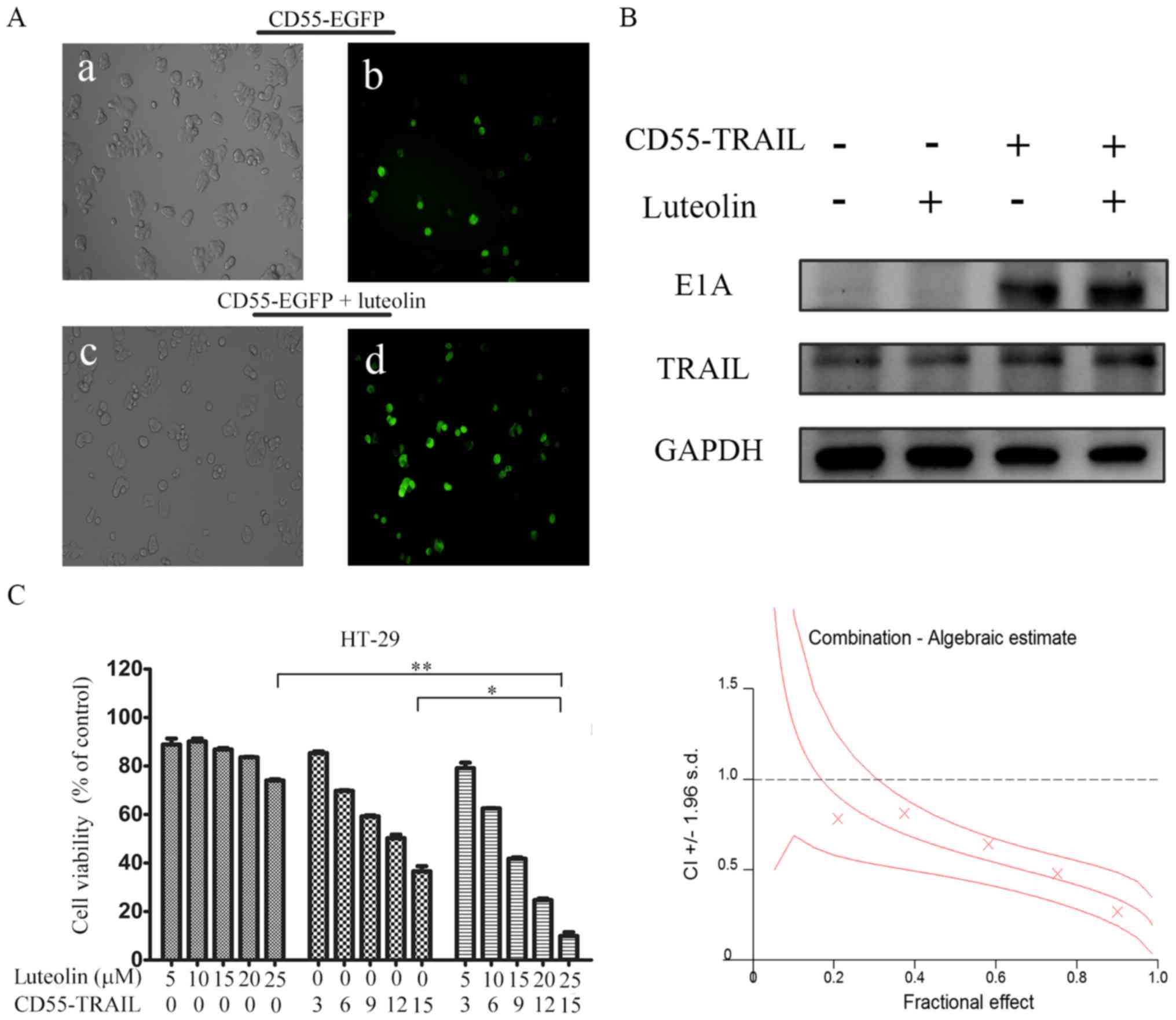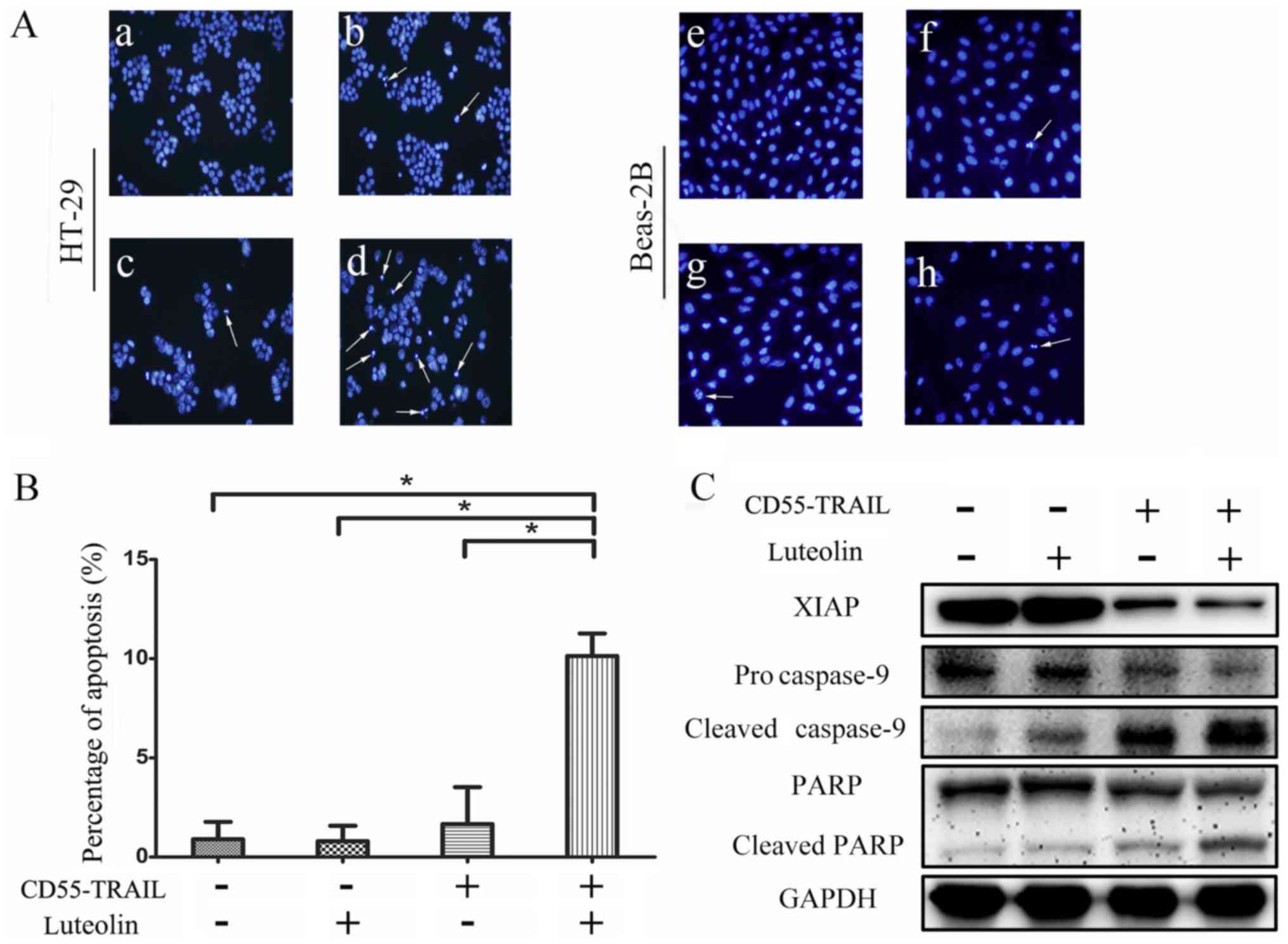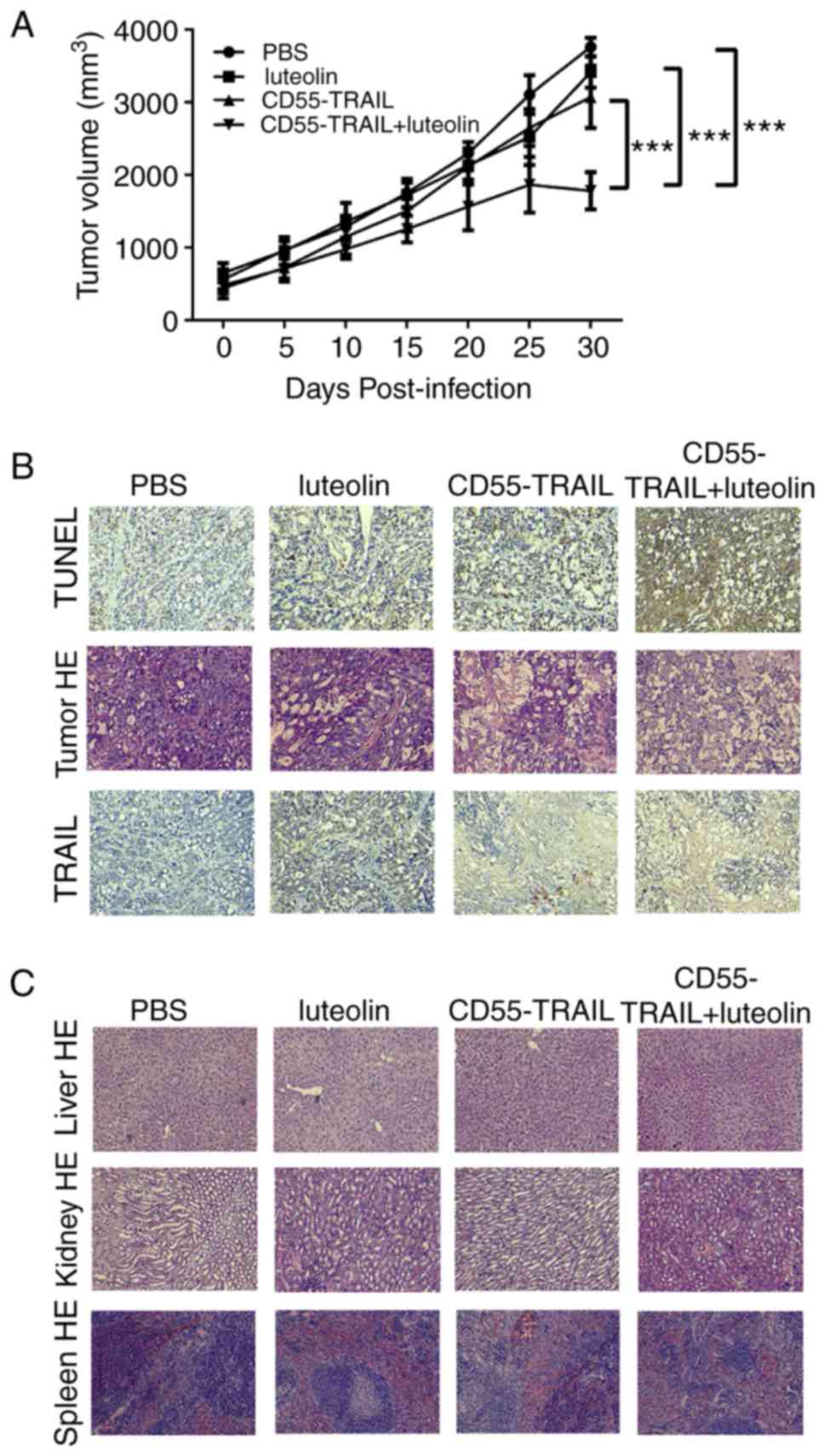|
1
|
Global battle against cancer won't be won
with treatment alone-effective prevention measures urgently needed
to prevent cancer crisis. Cent Eur J Public Health. 22:23–28.
2014.PubMed/NCBI
|
|
2
|
Breitbach CJ, Burke J, Jonker D,
Stephenson J, Haas AR, Chow LQ, Nieva J, Hwang TH, Moon A, Patt R,
et al: Intravenous delivery of a multi-mechanistic cancer-targeted
oncolytic poxvirus in humans. Nature. 477:99–102. 2011. View Article : Google Scholar : PubMed/NCBI
|
|
3
|
Liu XY: A new anticancer
strategy-gene-virotherapy of cancer. Chin J Cancer Biother.
8:12001.
|
|
4
|
Zhang ZL, Zou WG, Luo CX, Li BH, Wang JH,
Sun LY, Qian QJ and Liu XY: An armed oncolytic adenovirus system,
ZD55-gene, demonstrating potent antitumoral efficacy. Cell Res.
13:481–489. 2003. View Article : Google Scholar : PubMed/NCBI
|
|
5
|
Wang Y, Liu T, Huang P, Zhao H, Zhang R,
Ma B, Chen K, Huang F, Zhou X, Cui C and Liu X: A novel Golgi
protein (GOLPH2)-regulated oncolytic adenovirus exhibits potent
antitumor efficacy in hepatocellular carcinoma. Oncotarget.
6:13564–13578. 2015. View Article : Google Scholar : PubMed/NCBI
|
|
6
|
Lei W, Liu HB, Wang SB, Zhou XM, Zheng SD,
Guo KN, Ma BY, Xia YL, Tan WS, Liu XY and Wang YG: Tumor suppressor
in lung cancer-1 (TSLC1) mediated by dual-regulated oncolytic
adenovirus exerts specific antitumor actions in a mouse model. Acta
Pharmacol Sin. 34:531–540. 2013. View Article : Google Scholar : PubMed/NCBI
|
|
7
|
He G, Lei W, Wang S, Xiao R, Guo K, Xia Y,
Zhou X, Zhang K, Liu X and Wang Y: Overexpression of tumor
suppressor TSLC1 by a survivin-regulated oncolytic adenovirus
significantly inhibits hepatocellular carcinoma growth. J Cancer
Res Clin Oncol. 138:657–670. 2012. View Article : Google Scholar : PubMed/NCBI
|
|
8
|
Ashkenazi A, Pai RC, Fong S, Leung S,
Lawrence DA, Marsters SA, Blackie C, Chang L, McMurtrey AE, Hebert
A, et al: Safety and antitumor activity of recombinant soluble Apo2
ligand. J Clin Invest. 104:155–162. 1999. View Article : Google Scholar : PubMed/NCBI
|
|
9
|
Pan G, O'Rourke K, Chinnaiyan AM, Gentz R,
Ebner R, Ni J and Dixit VM: The receptor for the cytotoxic ligand
TRAIL. Science. 276:111–113. 1997. View Article : Google Scholar : PubMed/NCBI
|
|
10
|
Ma H, Liu Y, Liu S, Kung HF, Sun X, Zheng
D and Xu R: Recombinant adeno-associated virus-mediated TRAIL gene
therapy suppresses liver metastatic tumors. Int J Cancer.
116:314–321. 2005. View Article : Google Scholar : PubMed/NCBI
|
|
11
|
Zhang R, Zhang X, Ma B, Xiao B, Huang F,
Huang P, Ying C, Liu T and Wang Y: Enhanced antitumor effect of
combining TRAIL and MnSOD mediated by CEA-controlled oncolytic
adenovirus in lung cancer. Cancer Gene Ther. 23:168–177. 2016.
View Article : Google Scholar : PubMed/NCBI
|
|
12
|
Zhao L, Dong A, Gu J, Liu Z, Zhang Y,
Zhang W, Wang Y, He L, Qian C, Qian Q and Liu X: The antitumor
activity of TRAIL and IL-24 with replicating oncolytic adenovirus
in colorectal cancer. Cancer Gene Ther. 13:1011–1022. 2006.
View Article : Google Scholar : PubMed/NCBI
|
|
13
|
Hang ZQ, Zheng MF and Huang JH: Detection
and diagnostic value of serum carcinoembryonic antigen and
cytokeratin 19 fragment in lung cancer patients. Zhonghua Zhong Liu
Za Zhi. 33:847–849. 2011.(In Chinese). PubMed/NCBI
|
|
14
|
Verberne CJ, Nijboer CH, de Bock GH,
Grossmann I, Wiggers T and Havenga K: Evaluation of the use of
decision-support software in carcino-embryonic antigen (CEA)-based
follow-up of patients with colorectal cancer. BMC Med Inform Decis
Mak. 12:142012. View Article : Google Scholar : PubMed/NCBI
|
|
15
|
Wang YR, Yan JX and Wang LN: The
diagnostic value of serum carcino-embryonic antigen, alpha
fetoprotein and carbohydrate antigen 19-9 for colorectal cancer. J
Cancer Res Ther. 10 Suppl:S307–S309. 2014. View Article : Google Scholar
|
|
16
|
Shi J, Zheng D, Liu Y, Sham MH, Tam P,
Farzaneh F and Xu R: Overexpression of soluble TRAIL induces
apoptosis in human lung adenocarcinoma and inhibits growth of tumor
xenografts in nude mice. Cancer Res. 65:1687–1692. 2005. View Article : Google Scholar : PubMed/NCBI
|
|
17
|
Lai H, Jin Q, Lin Y, Mo X, Li B, He K and
Chen J: Combined use of lysyl oxidase, carcino-embryonic antigen,
and carbohydrate antigens improves the sensitivity of biomarkers in
predicting lymph node metastasis and peritoneal metastasis in
gastric cancer. Tumour Biol. 35:10547–10554. 2014. View Article : Google Scholar : PubMed/NCBI
|
|
18
|
Ross JA and Kasum CM: Dietary flavonoids:
Bioavailability, metabolic effects, and safety. Annu Rev Nutr.
22:19–34. 2002. View Article : Google Scholar : PubMed/NCBI
|
|
19
|
Huang YT, Hwang JJ, Lee PP, Ke FC, Huang
JH, Huang CJ, Kandaswami C, Middleton E Jr and Lee MT: Effects of
luteolin and quercetin, inhibitors of tyrosine kinase, on cell
growth and metastasis-associated properties in A431 cells
overexpressing epidermal growth factor receptor. Br J Pharmacol.
128:999–1010. 1999. View Article : Google Scholar : PubMed/NCBI
|
|
20
|
Ko WG, Kang TH, Lee SJ, Kim YC and Lee BH:
Effects of luteolin on the inhibition of proliferation and
induction of apoptosis in human myeloid leukaemia cells. Phytother
Res. 16:295–298. 2002. View
Article : Google Scholar : PubMed/NCBI
|
|
21
|
Kim JH, Jin YR, Park BS, Kim TJ, Kim SY,
Lim Y, Hong JT, Yoo HS and Yun YP: Luteolin prevents
PDGF-BB-induced proliferation of vascular smooth muscle cells by
inhibition of PDGF beta-receptor phosphorylation. Biochem
Pharmacol. 69:1715–1721. 2005. View Article : Google Scholar : PubMed/NCBI
|
|
22
|
Lee HJ, Wang CJ, Kuo HC, Chou FP, Jean LF
and Tseng TH: Induction apoptosis of luteolin in human hepatoma
HepG2 cells involving mitochondria translocation of Bax/Bak and
activation of JNK. Toxicol Appl Pharmacol. 203:124–131. 2005.
View Article : Google Scholar : PubMed/NCBI
|
|
23
|
Leung WC, Wu CH, Lin CH and Lee HZ:
Luteolin induced DNA damage leading to human lung squamous
carcinoma CH27 cell apoptosis. Eur J Pharmacol. 508:77–83. 2005.
View Article : Google Scholar : PubMed/NCBI
|
|
24
|
Bagli E, Stefaniotou M, Morbidelli L,
Ziche M, Psillas K, Murphy C and Fotsis T: Luteolin inhibits
vascular endothelial growth factor-induced angiogenesis; inhibition
of endothelial cell survival and proliferation by targeting
phosphatidylinositol 3′-kinase activity. Cancer Res. 64:7936–7946.
2004. View Article : Google Scholar : PubMed/NCBI
|
|
25
|
Pandurangan AK, Sadagopan SK Ananda,
Dharmalingam P and Ganapasam S: Luteolin, a bioflavonoid inhibits
Azoxymethane-induced colorectal cancer through activation of Nrf2
signaling. Toxicol Mech Methods. 24:13–20. 2014. View Article : Google Scholar : PubMed/NCBI
|
|
26
|
Park HS and Choi YH: Induction of
Apoptosis by Combination Treatment with Luteolin and TRAIL in T24
Human Bladder Cancer Cells. J Korean Society Food Sci Nut.
42:1363–1369. 2013. View Article : Google Scholar
|
|
27
|
Horinaka M, Yoshida T, Shiraishi T, Nakata
S, Wakada M, Nakanishi R, Nishino H and Sakai T: The combination of
TRAIL and luteolin enhances apoptosis in human cervical cancer HeLa
cells. Biochem Biophys Res Commun. 333:833–838. 2005. View Article : Google Scholar : PubMed/NCBI
|
|
28
|
Ma BY and Wang Y, Zhou X, Huang P, Zhang
R, Liu T, Cui C, Liu X and Wang Y: Synergistic suppression effect
on tumor growth of hepatocellular carcinoma by combining oncolytic
adenovirus carrying XAF1 with cisplatin. J Cancer Res Clin Oncol.
141:419–429. 2015. View Article : Google Scholar : PubMed/NCBI
|
|
29
|
Cheng PH, Lian S, Zhao R, Rao XM,
McMasters KM and Zhou HS: Combination of autophagy inducer
rapamycin and oncolytic adenovirus improves antitumor effect in
cancer cells. Virol J. 10:2932013. View Article : Google Scholar : PubMed/NCBI
|
|
30
|
Shi RX, Ong CN and Shen HM: Protein kinase
C inhibition and x-linked inhibitor of apoptosis protein
degradation contribute to the sensitization effect of luteolin on
tumor necrosis factor-related apoptosis-inducing ligand-induced
apoptosis in cancer cells. Cancer Res. 65:7815–7823. 2005.
View Article : Google Scholar : PubMed/NCBI
|
|
31
|
Wang L, Yao B, Li Q, Mei K, Xu JR, Li HX,
Wang YS, Wen YJ, Wang XD, Yang HS, et al: Gene therapy with
recombinant adenovirus encoding endostatin encapsulated in cationic
liposome in coxsackievirus and adenovirus receptor-deficient colon
carcinoma murine models. Hum Gene Ther. 22:1061–1069. 2011.
View Article : Google Scholar : PubMed/NCBI
|
|
32
|
Nigatu AS, Vupputuri S, Flynn N, Neely BJ
and Ramsey JD: Evaluation of cell-penetrating peptide/adenovirus
particles for transduction of CAR-negative cells. J Pharm Sci.
102:1981–1993. 2013. View Article : Google Scholar : PubMed/NCBI
|
|
33
|
Zhang SN, Choi IK, Huang JH, Yoo JY, Choi
KJ and Yun CO: Optimizing DC vaccination by combination with
oncolytic adenovirus coexpressing IL-12 and GM-CSF. Mol Ther.
19:1558–1568. 2011. View Article : Google Scholar : PubMed/NCBI
|
|
34
|
Yang Z, Zhang Q, Xu K, Shan J, Shen J, Liu
L, Xu Y, Xia F, Bie P, Zhang X, et al: Combined therapy with
cytokine-induced killer cells and oncolytic adenovirus expressing
IL-12 induce enhanced antitumor activity in liver tumor model. PLoS
One. 7:e448022012. View Article : Google Scholar : PubMed/NCBI
|
|
35
|
Wang F, Zheng Z, Guo J and Ding X:
Correlation and quantitation of microRNA aberrant expression in
tissues and sera from patients with breast tumor. Gynecol Oncol.
119:586–593. 2010. View Article : Google Scholar : PubMed/NCBI
|
|
36
|
Ding X, Ding J, Ning J, Yi F, Chen J, Zhao
D, Zheng J, Liang Z, Hu Z and Du Q: Circulating microRNA as a
potential biomarker for liver injury. Mol Med Rep. 5:1428–1432.
2012.PubMed/NCBI
|


















